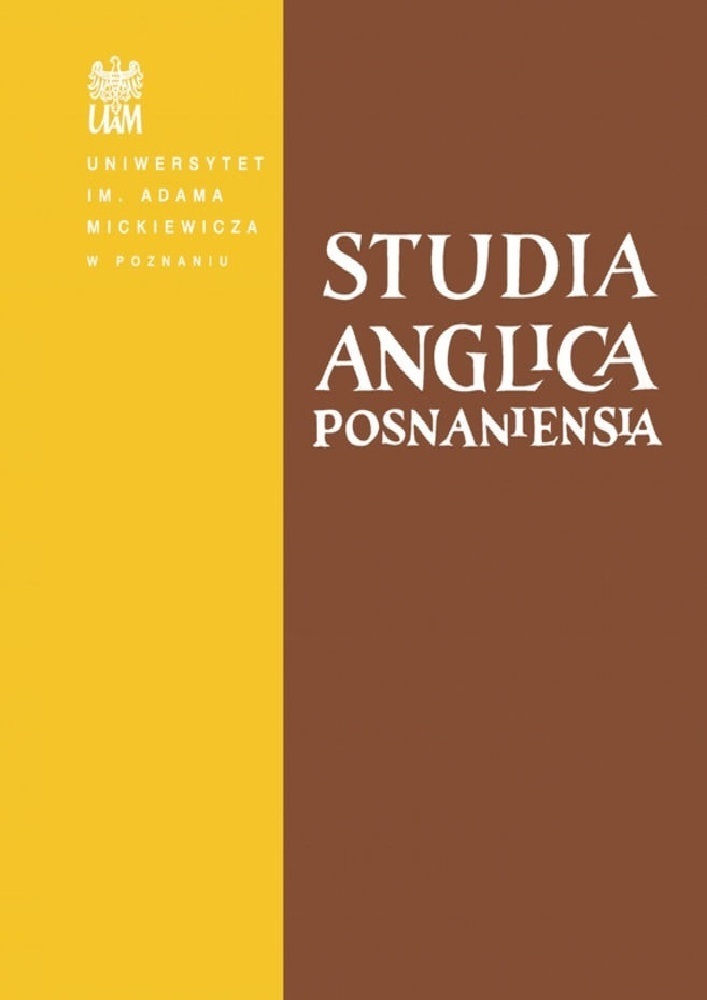Abstract
As you like it stands out from the rest of Shakespeare's plays as a comedy of conspicuously unusual dramaturgy. Critics have vindicated its idiosyncratic form claiming that As you like it's uneventful plot is due to the pastoral character of the play. Along with such typically pastoral elements as song contests or lover's woes they have listed its setting as an example of an idyllic locus amoenus. This article examines the actual character of the Forest of Arden and turns readers' attention towards the equivocal image of the place.
References
MacDonald, Hugh (ed.) 1962 England's Helicon. London: Routledge and Kegan.
Sannazaro, Jacopo 1948 L'Arcadia. ed. by Carrara Enrico. Torino: Unione Tipografico-Editrice Torinese.
Shakespeare, William 2001 As you like it. The Arden edition of the works of William Shakespeare. Edited by Agnes Latham (ed.) London: Methuen.
Alpers, Paul 1996 What is pastoral? Chicago - London: University of Chicago Press.
Barfield, Steven 2009 "A full moon risen and the sheep gathered round him: Exploring Samuel Beckett's uncanny postpastoral", in: David James - Phillip Tew (eds.) New version of pastoral. post-Romantic, modern and contemporary responses to the tradition, 156-173.
Bloch, Ernst 1976 "Arkadien und Utopien", in: Klaus Garber (ed.) Europäische Bukolik und Georgik, 1-7.
Bolewski, Jacek SJ 2002 Objawienie Szekspira. Warszawa: Biblioteka "Więzi".
Chaudhuri, Sukanta 1989 Renaissance pastoral and its English developments. Oxford: Clarendon Press.
Cooper, Helen 1977 Pastoral. Medieval into Renaissance. Rowman-Littlefield: D. S. Brewer.
Davis, J. C. 1981 Utopia and the ideal society. A study of English utopian writing 1516-1700. Cambridge: Cambridge University Press.
Garber, Klaus (ed.) 1976 Europäische Bukolik und Georgik. Darmstadt: Wissenschaftliche Buchgesellschaft.
Gibińska, Marta - Marta Kapera - Jacek Fabiszak (eds.) 2003 Szekspir: leksykon. Kraków: Znak.
Głowiński, Michał - Teresa Kostakiewiczowa - Aleksandra Okopień-Sławińska - Janusz Sławiński (eds.) 1998 Słownik terminów literackich. Wrocław: Zakład Narodowy im. Ossolińskich.
James, David - Phillip Tew (eds.) 2009 New versions of pastoral. Post-Romantic, modern and contemporary responses to the tradition. Madison: Fairleigh Dickinson University Press.
Hunter, G. K. 1962 William Shakespeare: The late comedies. London: Longmans, Green.
Kumar, Krishan 1987 Utopia and anti-utopia in modern times. Oxford: Basil Blackwell.
Loughrey, Bryan (ed.) 1984 The pastoral mode. A casebook. London: Macmillan Publishers.
Mangan, Michael 1996 A preface to Shakespeare's comedies: 1594-1603. London: Longman.
Marinelli, Peter 1971 Pastoral. London: Methuen.
Panofsky, Erwin 1996 Sinn und Deutung in der bildenden Kunst. Köln: DuMont Buchverlag.
Plezia, Marian (ed.) 1998 Słownik Łacińsko-Polski. Warszawa: Wydawnictwo Naukowe PWN
Salingar, Leo 1974 Shakespeare and the traditions of comedy. Cambridge: Cambridge University Press.
Seeber, Hans-Urlich 1979 Moderne Pastoraldichtung in England. Studien zur Theorie und Praxis der pastoralen Versdichtung in England nach 1800 mit besonderer Berücksichtigung von Edward Thomas (1878-1917). Frankfurt am Main: Peter D. Lang.
Schmidt, Ernst A. 1972 Poetische Reflexion. Vergils Bukolik. München: Wilhelm Fink Verlag.
Smith, Hallett 1966 Elizabethan poetry. A study in conventions, meaning, and expression. Cambridge: Harvard University Press.
Snell, Bruno 1976 "Arkadien. Die Entdeckung einer geistigen Landschaft", in: Klaus Garber (ed.) Europäische Bukolik und Georgik, 14-43.
Snyder, Susan 1998 Pastoral process. Spenser, Marvell, Milton. Stanford: Stanford University Press.
